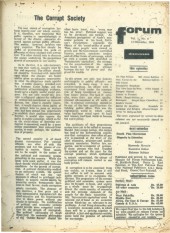
Inside
|
The Corrupt Society The sour stench of corruption has hung heavily over our whole society. It is, therefore, not surprising that public opinion is overwhelmingly in favour of the drastic measures directed against corrupt public officials. This matter, however, involves two vital enquiries. The first should be aimed at determining the guilt or innocence of those charged with corruption. The other should seek to discover the causes underlying the gangrenous growth of corruption in our society.
The second enquiry is of much greater consequence. For corrupt officials are after all only the products and not the causes of corruption in society. These causes are to be sought in the nature of the political and economic system prevailing in the country. While the seeds were sown earlier, it was the Ayub decade which provided hothouse conditions for the growth of corruption. A political dictatorship wedded to an economic system, the special feature of which was the vast prospects it offered to privileged individuals to acquire wealth merely by procuring certain bureaucratic decisions in their favour, made corruption utterly inevitable. The absence of free elections, a free press and a truly representative legislature left the chief executive and his functionaries free to abuse power without any checks or restraints. No combination of political and economic systems could provide more congenial condition for the growth of corruption. The political philosophy of Ayub Khan and the economic philosophy of the 'Robber Barons' shared the same basic tenet, viz... 'every man has his price'. Political support was to be purchased, not earned. An American protagonist of Ayub's economic policies in his book, Pakistan's Development, expounds the theory of the 'social utility of greed'. Thus, since, people were viewed as greedy and the Government controlled licenses, permits, sanctions, tenders and all other forms of patronage, which go with a system best described as 'bureaucratic capitalism', the strategy for the perpetuation of the regime was based on forging an alliance between the lust for power and the greed for wealth. In this system not only was honesty and integrity in public officials, not rewarded, in many cases it was a positive handicap. An officer with a conscience lived under the constant risk of being transferred at twenty four hours' notice. The lack of scruples, more than any other quality, Ensured advancement in all walks of life. A criminal conviction seemed to be one of the best qualifications for holding public office. This was the nightmarish world in which every value had been stood upon its head and honesty had been made to become the worst policy. The architects of that preposterous system have yet to be called to account. Should they escape justice, this cannot but lead to the demoralising conclusion that corruption does after all pay if it is practised at the level of the chief executive, ministers and parliamentary secretaries. Neither law, nor justice, can be a respecter of persons. If those persons who had founded the system and set the pace for the corrupt practices which symbolised it, remain unpunished, the cancer of corruption will remain rooted in our body politic. If corruption is to be exorcised from our society, as it must, then it will not suffice to call to account only public servants or to re-organise the services. The progenitors of the corrupt political and economic system must also be brought to book, and society as a whole must be re-organised. Given the acute scarcity of resources and the pressing demands of the people for the basic necessities of life, 'bureaucratic capitalism' must be rejected out of hand as an economic system which has no relevance to our problems. A real living democracy and a socialistic economic order, in which there will be a striving together to establish a just and egalitarian society, alone hold the promise of salvation for our society.
|
|||||||||||||||||||||||||||||
 As to the first, it is only necessary to urge that such an enquiry must be fair and impartial. The officer charged should be furnished with materials upon which the charges are based and be given an adequate opportunity to rebut the allegations made against him. A public enquiry, presided over by a Supreme Court Judge, and the publication of incriminating evidence, would serve a highly useful social purpose. For not only would this provide a safeguard against the infliction of undeserved punishment on innocent persons, but what is equally important, it would deprive those guilty of the pretext later to pose as martyrs who had been denied the opportunity to establish their professed innocence. Further, it would also expose the guilty to public contempt, which so far as the social object of deterring corruption is concerned, would be a more telling punishment than removal from service, or even perhaps, the confiscation of property.
As to the first, it is only necessary to urge that such an enquiry must be fair and impartial. The officer charged should be furnished with materials upon which the charges are based and be given an adequate opportunity to rebut the allegations made against him. A public enquiry, presided over by a Supreme Court Judge, and the publication of incriminating evidence, would serve a highly useful social purpose. For not only would this provide a safeguard against the infliction of undeserved punishment on innocent persons, but what is equally important, it would deprive those guilty of the pretext later to pose as martyrs who had been denied the opportunity to establish their professed innocence. Further, it would also expose the guilty to public contempt, which so far as the social object of deterring corruption is concerned, would be a more telling punishment than removal from service, or even perhaps, the confiscation of property. 